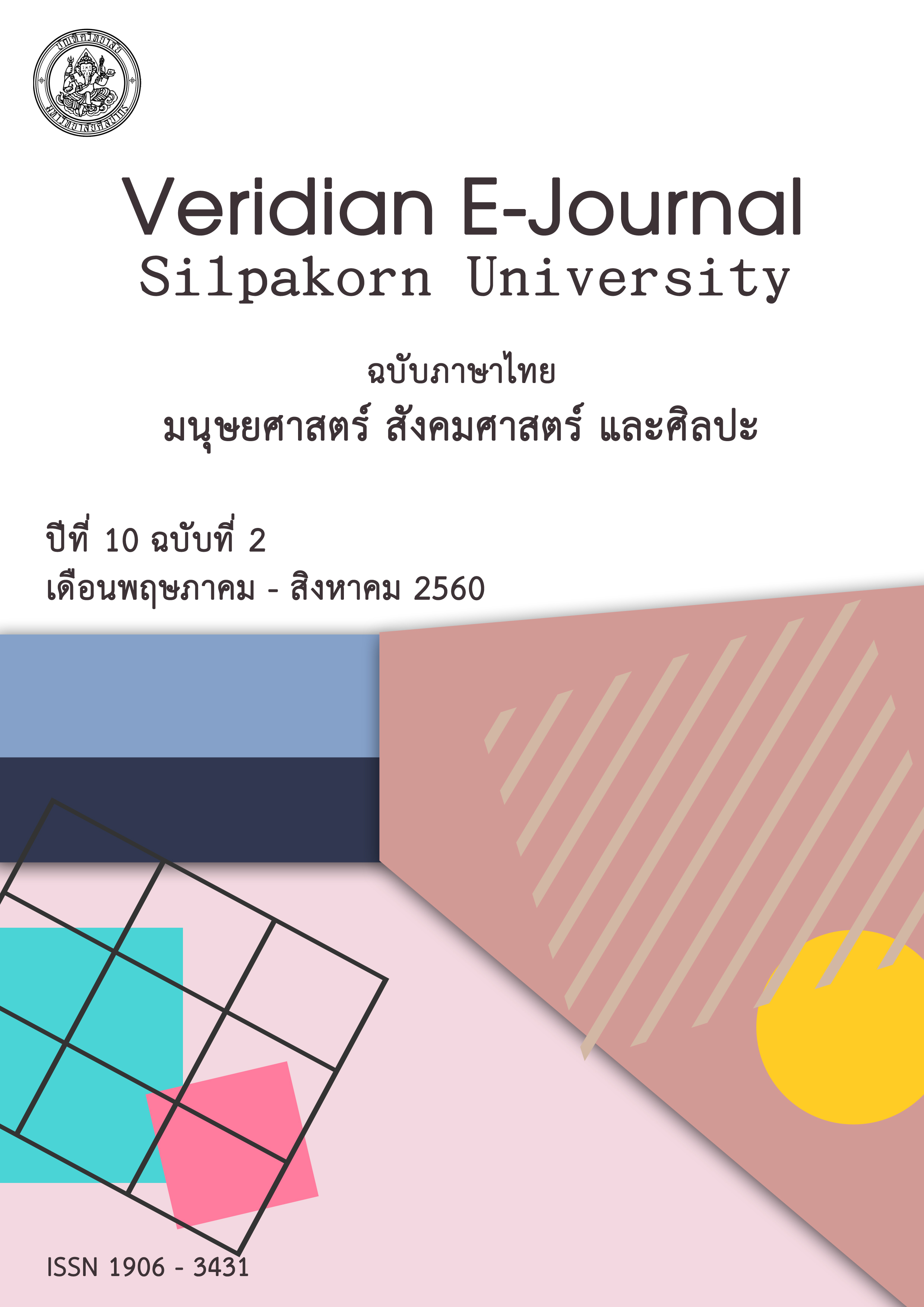การพัฒนาหลักสูตรออนไลน์เพื่อเสริมสร้างทักษะสร้างสรรค์นวัตกรรม
Main Article Content
Abstract
การวิจัยครั้งนี้มีความมุ่งหมาย 1) เพื่อพัฒนาหลักสูตรออนไลน์เพื่อเสริมสร้างทักษะสร้างสรรค์นวัตกรรม และ 2) เพื่อศึกษาประสิทธิผลของหลักสูตรออนไลน์เพื่อเสริมสร้างทักษะสร้างสรรค์นวัตกรรม โดย มีขั้นตอนการดำเนินการ 4 ขั้นตอน คือ ขั้นตอนที่ 1 การศึกษา วิเคราะห์ และสังเคราะห์ข้อมูลพื้นฐาน ขั้นตอน ที่ 2 การพัฒนา (ร่าง) หลักสูตรออนไลน์เพื่อเสริมสร้างทักษะสร้างสรรค์นวัตกรรม ขั้นตอนที่ 3 การทดลองใช้หลักสูตรออนไลน์เพื่อเสริมสร้างทักษะสร้างสรรค์นวัตกรรม ขั้นตอนที่ 4 การประเมินผลและปรับปรุงหลักสูตรออนไลน์เพื่อเสริมสร้างทักษะสร้างสรรค์นวัตกรรมการวิเคราะห์เชิงปริมาณ ดำเนินการวิเคราะห์ข้อมูลเชิงปริมาณโดยใช้โปรแกรมวิเคราะห์ค่าสถิติพื้นฐาน ได้แก่ การหาค่าเฉลี่ย ส่วนเบี่ยงเบนมาตรฐานการวิเคราะห์ค่าที (t-test แบบ Dependent) ค่าอำนาจจำแนกแบบ Item total correlation ค่าความเชื่อมั่นแบบสัมประสิทธิ์แอลฟ่า และวิเคราะห์ข้อมูลเชิงคุณภาพโดยวิธีวิเคราะห์เนื้อหา โดยการศึกษาแบบพรรณนาวิเคราะห์จากเอกสาร การทดลอง การบันทึกผลระหว่างการทดลอง บันทึกพฤติกรรมผู้เรียนและการนำเสนอผลงานของผู้เรียน
ผลการวิจัยทำให้ได้หลักสูตรออนไลน์ กระบวนการจัดการเรียนรู้จินตวิศวกรรม และแนวทางการพัฒนาทักษะสร้างสรรค์นวัตกรรมของผู้เรียน ตรวจสอบประสิทธิผลของหลักสูตรออนไลน์โดยใช้แบบแผนการทดลอง แบบ One Group Pretest-Posttest Design ทำการทดลองกับนักเรียนกลุ่มตัวอย่าง คือ นักเรียนชั้นมัธยมศึกษาปีที่ 2 จำนวน 40 คน โดยใช้วิธีการเลือกแบบเจาะจง ผลการวิจัยพบว่านักเรียนกลุ่มตัวอย่างมีค่าเฉลี่ยคะแนนทักษะสร้างสรรค์นวัตกรรมหลังเรียนสูงกว่าก่อนเรียนอย่างมีนัยสำคัญทางสถิติที่ระดับ 0.05 นักเรียนมีความคิดเห็นต่อหลักสูตรออนไลน์อยู่ในระดับมากที่สุดมีคะแนนเฉลี่ยเท่ากับ 4.66 ค่าเบี่ยงเบนมาตรฐาน 0.38 ค่าที (t-test แบบ Dependent) เท่ากับ 9.81 ผลการประเมินหลักสูตรออนไลน์ พบว่า มีประสิทธิผลตามเกณฑ์ที่กำหนด หลังจากการทดลองผู้วิจัยได้ดำเนินการปรับปรุงหลักสูตรและแผนการจัดการเรียนรู้ด้านกิจกรรมการเรียนรู้ของผู้เรียนให้มีความเหมาะสมยิ่งขึ้นและจัดทำเป็นหลักสูตรออนไลน์ เพื่อเสริมสร้างทักษะสร้างสรรค์นวัตกรรมฉบับสมบูรณ์
The purposes of this research were as follows: 1) to develop an online curriculum to enhance creative innovation skills; 2) to evaluate the effectiveness of the online curriculum to enhance creative innovation skills. The processes of the research were conducted as the research and development consisted of four phase, as follows: Stage 1) to study, analyze and synthesize data; Stage 2) to develop a draft of an online curriculum to enhance creative innovation skills; Stage 3) to implement an online curriculum to enhance creative innovation skills; Stage 4) to evaluate and develop the online curriculum to enhance creative innovation skills. The quantitative analysis employed quantitative analysis with statistics, including average, standard deviation analysis, dependent t-test, item total correlation discrimination, confidence coefficient alpha, and an analysis of qualitative data by analyzing the content of the documents from the results recorded during the trial, in particular the behavior of learners and presentations by the students of descriptive studies.The research results have an online curriculum, Imagineering learning process,
development of innovation skills, monitoring the effectiveness of an online curriculum using the experimental One Group Pretest-Posttest Design. The population consisted of forty students in grade eight by specific selection. The results recorded that the students in the sample had an average score in term of skills and innovation, with were higher than before the study at a statistically significant level of 0.05. Students commented an online curriculum with an average score of 4.66 and a standard deviation of 0.38 and t-test dependent at 9.81. The results showed that the effectiveness of the online curriculum meets all of the requirement. After the experiment, researchers continue to improve curriculum, lesson plans and learning activities of the students had to be more nuanced and the preparation of such courses in terms of technical innovation.
